Dissertation: Reward Systems and their Impact on Employee Performance
VerifiedAdded on 2023/06/05
|27
|9476
|279
Dissertation
AI Summary
This dissertation investigates the impact of reward systems on employee performance. It begins by defining reward systems as monetary and non-monetary payments provided to employees in exchange for their work, encompassing both extrinsic and intrinsic rewards. The study highlights the importance of reward systems in aligning employee goals with organizational objectives, driving business growth, and boosting staff morale. It addresses the problem of retaining skilled employees in a competitive business environment and examines how a well-designed reward system can motivate employees and improve performance. The research aims to understand the effect of reward systems on employee performance, ascertain the concept of reward systems, analyze their impact, and determine the challenges in managing them to improve organizational productivity. The methodology involves qualitative research, interpretivism philosophy, and an inductive approach, utilizing primary data from interviews and secondary data from existing literature. The dissertation is structured into chapters covering the introduction, literature review, research methodology, data analysis, and conclusion with recommendations. It presents different perspectives on reward systems, including their potential to motivate high performers and demotivate low performers, and analyzes the impact of financial versus non-financial rewards on employee performance. The study concludes by offering insights and recommendations for organizations to effectively manage reward systems and enhance employee performance.
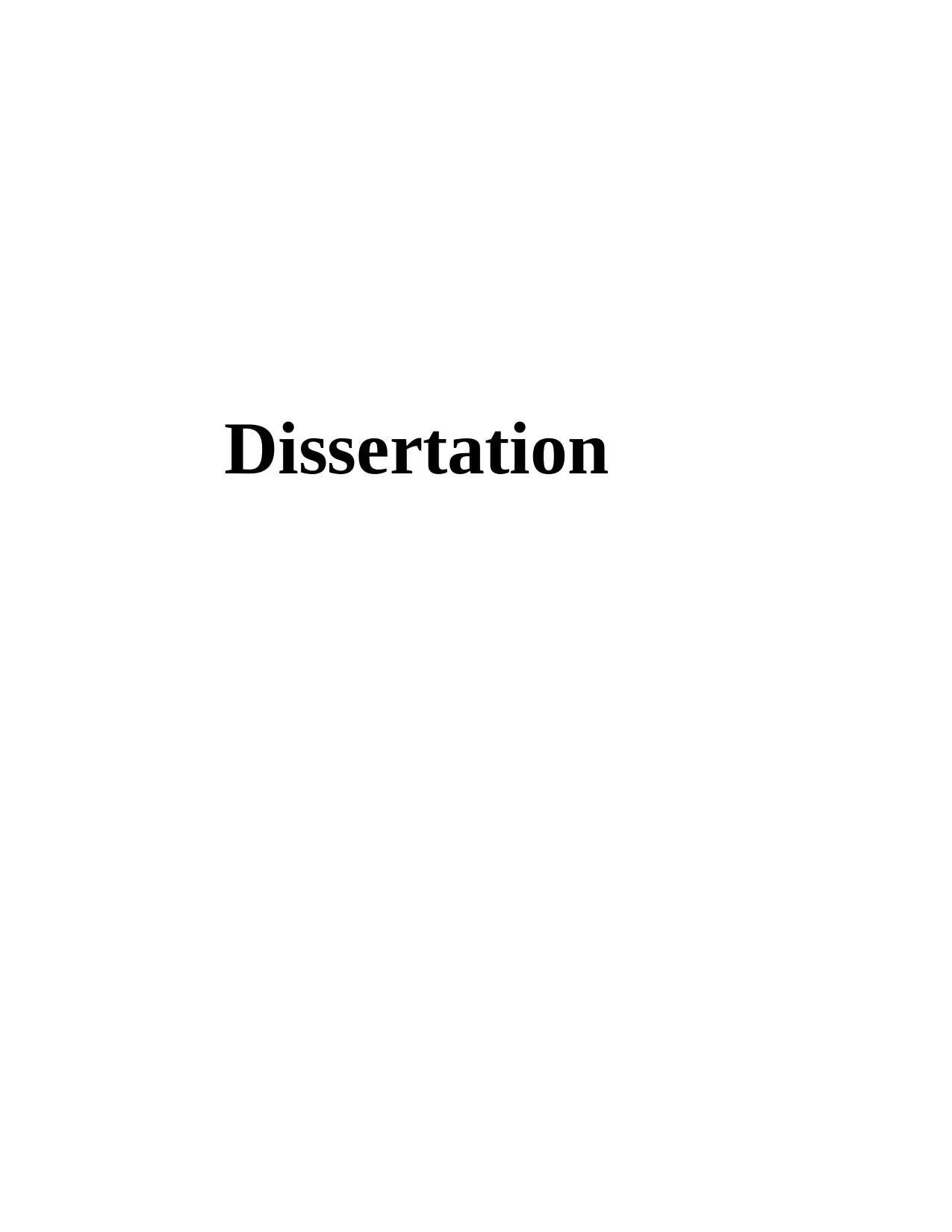
Dissertation
Paraphrase This Document
Need a fresh take? Get an instant paraphrase of this document with our AI Paraphraser

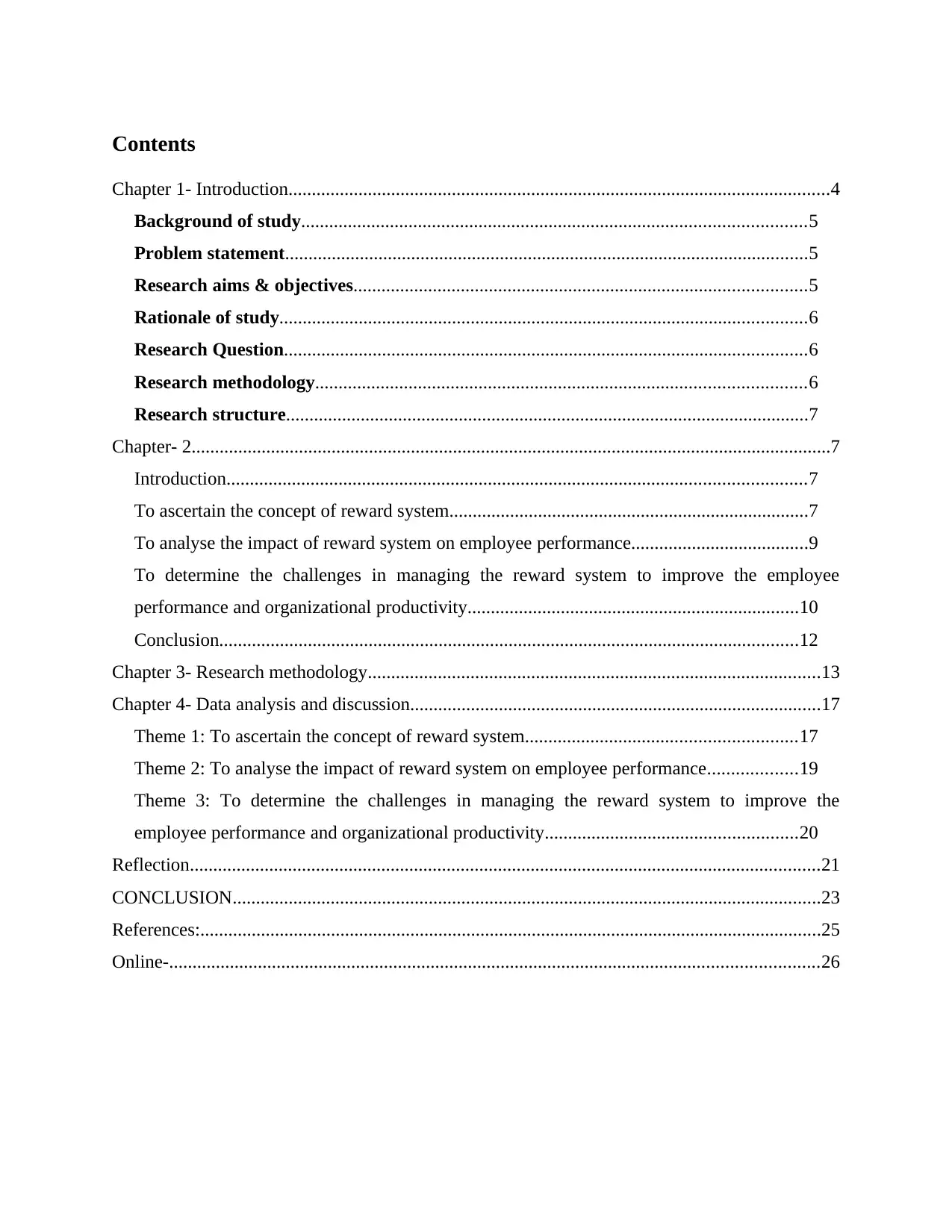
Contents
Chapter 1- Introduction....................................................................................................................4
Background of study............................................................................................................5
Problem statement................................................................................................................5
Research aims & objectives.................................................................................................5
Rationale of study.................................................................................................................6
Research Question................................................................................................................6
Research methodology.........................................................................................................6
Research structure................................................................................................................7
Chapter- 2.........................................................................................................................................7
Introduction............................................................................................................................7
To ascertain the concept of reward system.............................................................................7
To analyse the impact of reward system on employee performance......................................9
To determine the challenges in managing the reward system to improve the employee
performance and organizational productivity.......................................................................10
Conclusion............................................................................................................................12
Chapter 3- Research methodology.................................................................................................13
Chapter 4- Data analysis and discussion........................................................................................17
Theme 1: To ascertain the concept of reward system..........................................................17
Theme 2: To analyse the impact of reward system on employee performance...................19
Theme 3: To determine the challenges in managing the reward system to improve the
employee performance and organizational productivity......................................................20
Reflection.......................................................................................................................................21
CONCLUSION..............................................................................................................................23
References:.....................................................................................................................................25
Online-...........................................................................................................................................26
Chapter 1- Introduction....................................................................................................................4
Background of study............................................................................................................5
Problem statement................................................................................................................5
Research aims & objectives.................................................................................................5
Rationale of study.................................................................................................................6
Research Question................................................................................................................6
Research methodology.........................................................................................................6
Research structure................................................................................................................7
Chapter- 2.........................................................................................................................................7
Introduction............................................................................................................................7
To ascertain the concept of reward system.............................................................................7
To analyse the impact of reward system on employee performance......................................9
To determine the challenges in managing the reward system to improve the employee
performance and organizational productivity.......................................................................10
Conclusion............................................................................................................................12
Chapter 3- Research methodology.................................................................................................13
Chapter 4- Data analysis and discussion........................................................................................17
Theme 1: To ascertain the concept of reward system..........................................................17
Theme 2: To analyse the impact of reward system on employee performance...................19
Theme 3: To determine the challenges in managing the reward system to improve the
employee performance and organizational productivity......................................................20
Reflection.......................................................................................................................................21
CONCLUSION..............................................................................................................................23
References:.....................................................................................................................................25
Online-...........................................................................................................................................26
⊘ This is a preview!⊘
Do you want full access?
Subscribe today to unlock all pages.

Trusted by 1+ million students worldwide
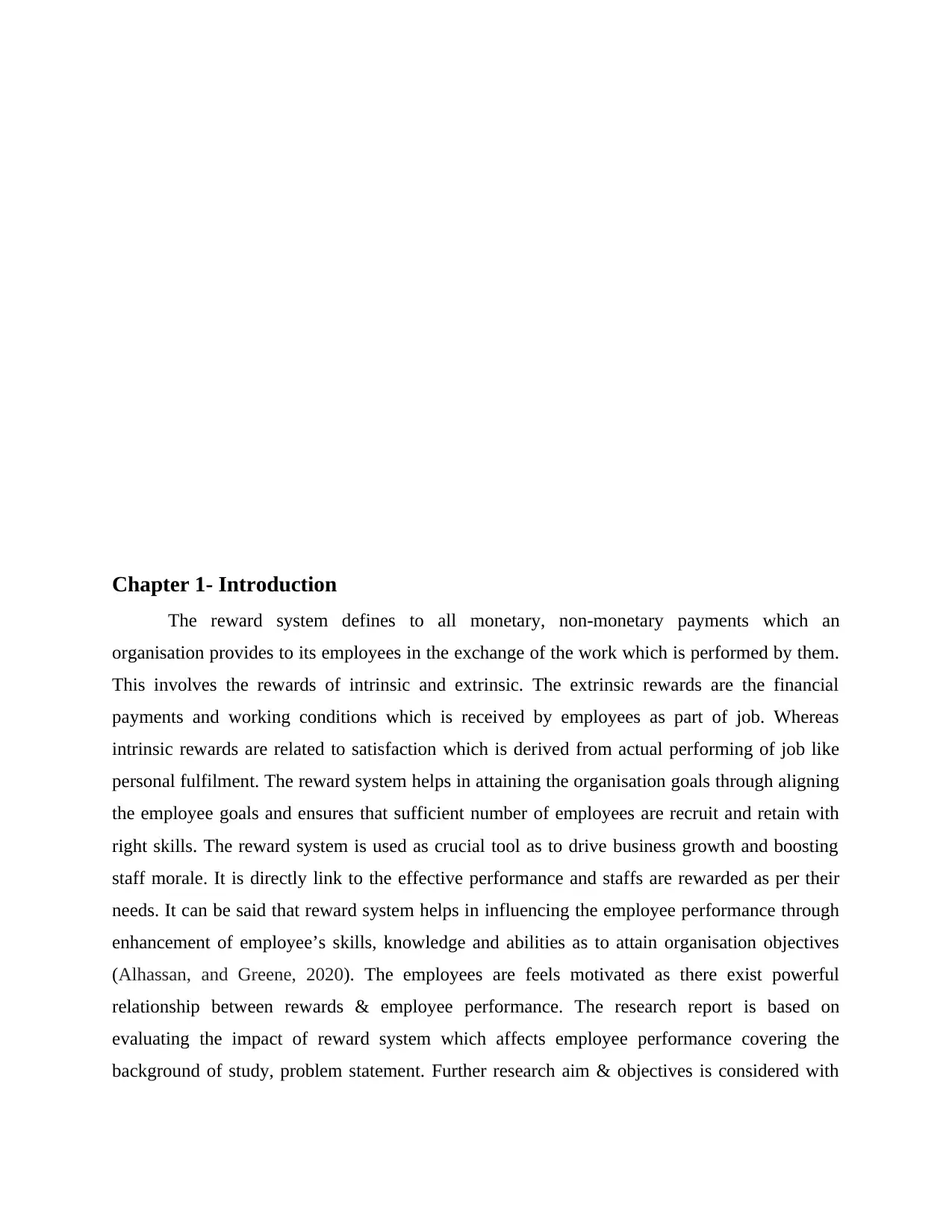
Chapter 1- Introduction
The reward system defines to all monetary, non-monetary payments which an
organisation provides to its employees in the exchange of the work which is performed by them.
This involves the rewards of intrinsic and extrinsic. The extrinsic rewards are the financial
payments and working conditions which is received by employees as part of job. Whereas
intrinsic rewards are related to satisfaction which is derived from actual performing of job like
personal fulfilment. The reward system helps in attaining the organisation goals through aligning
the employee goals and ensures that sufficient number of employees are recruit and retain with
right skills. The reward system is used as crucial tool as to drive business growth and boosting
staff morale. It is directly link to the effective performance and staffs are rewarded as per their
needs. It can be said that reward system helps in influencing the employee performance through
enhancement of employee’s skills, knowledge and abilities as to attain organisation objectives
(Alhassan, and Greene, 2020). The employees are feels motivated as there exist powerful
relationship between rewards & employee performance. The research report is based on
evaluating the impact of reward system which affects employee performance covering the
background of study, problem statement. Further research aim & objectives is considered with
The reward system defines to all monetary, non-monetary payments which an
organisation provides to its employees in the exchange of the work which is performed by them.
This involves the rewards of intrinsic and extrinsic. The extrinsic rewards are the financial
payments and working conditions which is received by employees as part of job. Whereas
intrinsic rewards are related to satisfaction which is derived from actual performing of job like
personal fulfilment. The reward system helps in attaining the organisation goals through aligning
the employee goals and ensures that sufficient number of employees are recruit and retain with
right skills. The reward system is used as crucial tool as to drive business growth and boosting
staff morale. It is directly link to the effective performance and staffs are rewarded as per their
needs. It can be said that reward system helps in influencing the employee performance through
enhancement of employee’s skills, knowledge and abilities as to attain organisation objectives
(Alhassan, and Greene, 2020). The employees are feels motivated as there exist powerful
relationship between rewards & employee performance. The research report is based on
evaluating the impact of reward system which affects employee performance covering the
background of study, problem statement. Further research aim & objectives is considered with
Paraphrase This Document
Need a fresh take? Get an instant paraphrase of this document with our AI Paraphraser
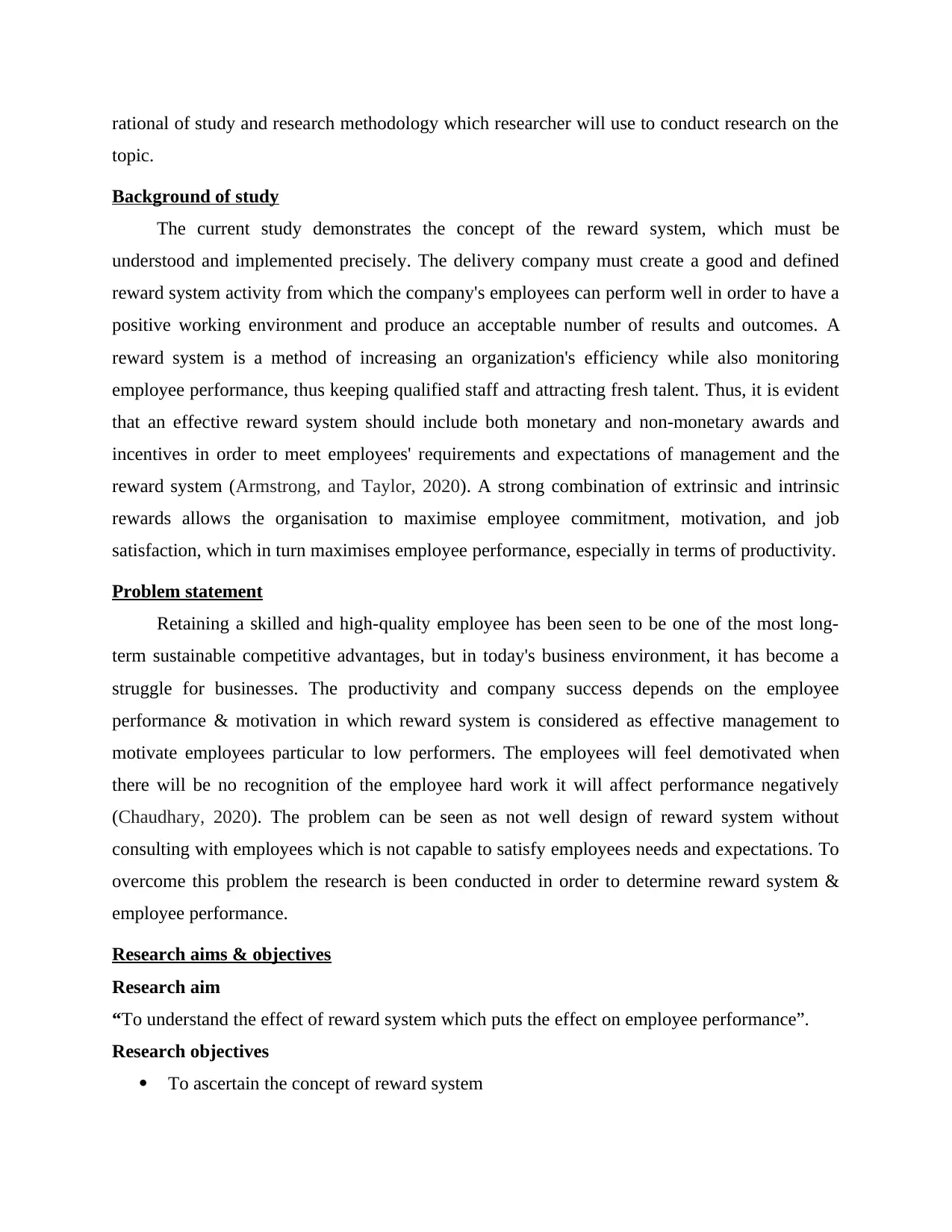
rational of study and research methodology which researcher will use to conduct research on the
topic.
Background of study
The current study demonstrates the concept of the reward system, which must be
understood and implemented precisely. The delivery company must create a good and defined
reward system activity from which the company's employees can perform well in order to have a
positive working environment and produce an acceptable number of results and outcomes. A
reward system is a method of increasing an organization's efficiency while also monitoring
employee performance, thus keeping qualified staff and attracting fresh talent. Thus, it is evident
that an effective reward system should include both monetary and non-monetary awards and
incentives in order to meet employees' requirements and expectations of management and the
reward system (Armstrong, and Taylor, 2020). A strong combination of extrinsic and intrinsic
rewards allows the organisation to maximise employee commitment, motivation, and job
satisfaction, which in turn maximises employee performance, especially in terms of productivity.
Problem statement
Retaining a skilled and high-quality employee has been seen to be one of the most long-
term sustainable competitive advantages, but in today's business environment, it has become a
struggle for businesses. The productivity and company success depends on the employee
performance & motivation in which reward system is considered as effective management to
motivate employees particular to low performers. The employees will feel demotivated when
there will be no recognition of the employee hard work it will affect performance negatively
(Chaudhary, 2020). The problem can be seen as not well design of reward system without
consulting with employees which is not capable to satisfy employees needs and expectations. To
overcome this problem the research is been conducted in order to determine reward system &
employee performance.
Research aims & objectives
Research aim
“To understand the effect of reward system which puts the effect on employee performance”.
Research objectives
To ascertain the concept of reward system
topic.
Background of study
The current study demonstrates the concept of the reward system, which must be
understood and implemented precisely. The delivery company must create a good and defined
reward system activity from which the company's employees can perform well in order to have a
positive working environment and produce an acceptable number of results and outcomes. A
reward system is a method of increasing an organization's efficiency while also monitoring
employee performance, thus keeping qualified staff and attracting fresh talent. Thus, it is evident
that an effective reward system should include both monetary and non-monetary awards and
incentives in order to meet employees' requirements and expectations of management and the
reward system (Armstrong, and Taylor, 2020). A strong combination of extrinsic and intrinsic
rewards allows the organisation to maximise employee commitment, motivation, and job
satisfaction, which in turn maximises employee performance, especially in terms of productivity.
Problem statement
Retaining a skilled and high-quality employee has been seen to be one of the most long-
term sustainable competitive advantages, but in today's business environment, it has become a
struggle for businesses. The productivity and company success depends on the employee
performance & motivation in which reward system is considered as effective management to
motivate employees particular to low performers. The employees will feel demotivated when
there will be no recognition of the employee hard work it will affect performance negatively
(Chaudhary, 2020). The problem can be seen as not well design of reward system without
consulting with employees which is not capable to satisfy employees needs and expectations. To
overcome this problem the research is been conducted in order to determine reward system &
employee performance.
Research aims & objectives
Research aim
“To understand the effect of reward system which puts the effect on employee performance”.
Research objectives
To ascertain the concept of reward system
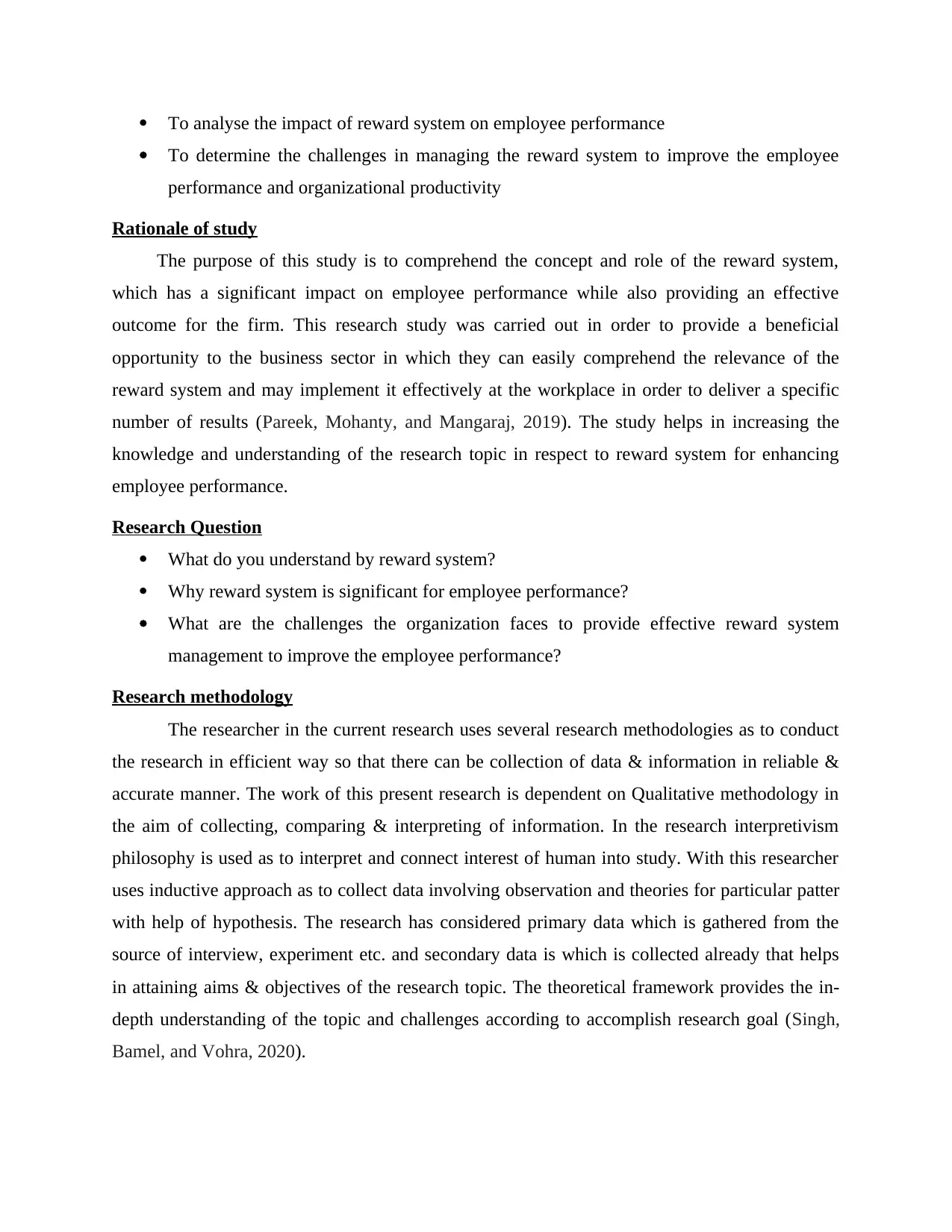
To analyse the impact of reward system on employee performance
To determine the challenges in managing the reward system to improve the employee
performance and organizational productivity
Rationale of study
The purpose of this study is to comprehend the concept and role of the reward system,
which has a significant impact on employee performance while also providing an effective
outcome for the firm. This research study was carried out in order to provide a beneficial
opportunity to the business sector in which they can easily comprehend the relevance of the
reward system and may implement it effectively at the workplace in order to deliver a specific
number of results (Pareek, Mohanty, and Mangaraj, 2019). The study helps in increasing the
knowledge and understanding of the research topic in respect to reward system for enhancing
employee performance.
Research Question
What do you understand by reward system?
Why reward system is significant for employee performance?
What are the challenges the organization faces to provide effective reward system
management to improve the employee performance?
Research methodology
The researcher in the current research uses several research methodologies as to conduct
the research in efficient way so that there can be collection of data & information in reliable &
accurate manner. The work of this present research is dependent on Qualitative methodology in
the aim of collecting, comparing & interpreting of information. In the research interpretivism
philosophy is used as to interpret and connect interest of human into study. With this researcher
uses inductive approach as to collect data involving observation and theories for particular patter
with help of hypothesis. The research has considered primary data which is gathered from the
source of interview, experiment etc. and secondary data is which is collected already that helps
in attaining aims & objectives of the research topic. The theoretical framework provides the in-
depth understanding of the topic and challenges according to accomplish research goal (Singh,
Bamel, and Vohra, 2020).
To determine the challenges in managing the reward system to improve the employee
performance and organizational productivity
Rationale of study
The purpose of this study is to comprehend the concept and role of the reward system,
which has a significant impact on employee performance while also providing an effective
outcome for the firm. This research study was carried out in order to provide a beneficial
opportunity to the business sector in which they can easily comprehend the relevance of the
reward system and may implement it effectively at the workplace in order to deliver a specific
number of results (Pareek, Mohanty, and Mangaraj, 2019). The study helps in increasing the
knowledge and understanding of the research topic in respect to reward system for enhancing
employee performance.
Research Question
What do you understand by reward system?
Why reward system is significant for employee performance?
What are the challenges the organization faces to provide effective reward system
management to improve the employee performance?
Research methodology
The researcher in the current research uses several research methodologies as to conduct
the research in efficient way so that there can be collection of data & information in reliable &
accurate manner. The work of this present research is dependent on Qualitative methodology in
the aim of collecting, comparing & interpreting of information. In the research interpretivism
philosophy is used as to interpret and connect interest of human into study. With this researcher
uses inductive approach as to collect data involving observation and theories for particular patter
with help of hypothesis. The research has considered primary data which is gathered from the
source of interview, experiment etc. and secondary data is which is collected already that helps
in attaining aims & objectives of the research topic. The theoretical framework provides the in-
depth understanding of the topic and challenges according to accomplish research goal (Singh,
Bamel, and Vohra, 2020).
⊘ This is a preview!⊘
Do you want full access?
Subscribe today to unlock all pages.

Trusted by 1+ million students worldwide
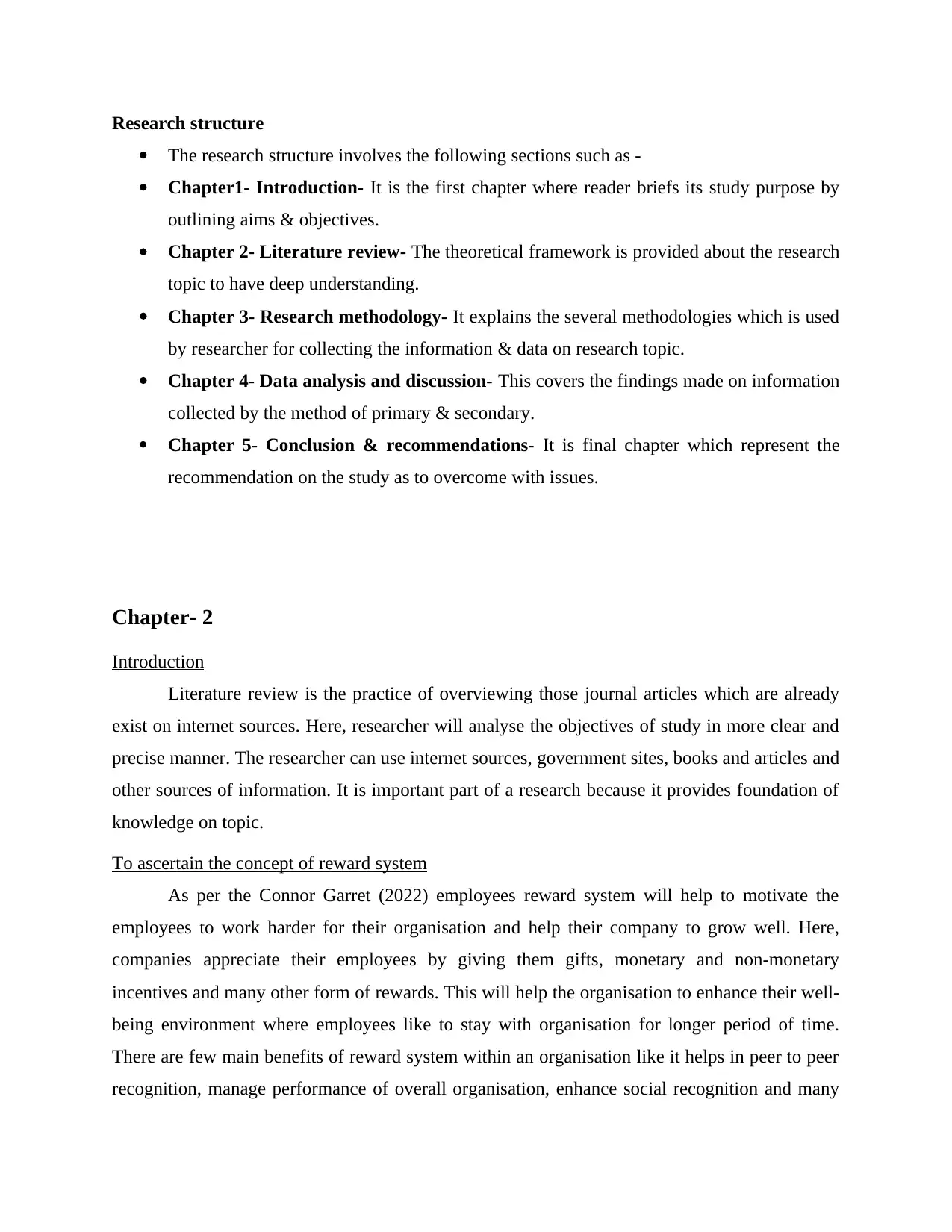
Research structure
The research structure involves the following sections such as -
Chapter1- Introduction- It is the first chapter where reader briefs its study purpose by
outlining aims & objectives.
Chapter 2- Literature review- The theoretical framework is provided about the research
topic to have deep understanding.
Chapter 3- Research methodology- It explains the several methodologies which is used
by researcher for collecting the information & data on research topic.
Chapter 4- Data analysis and discussion- This covers the findings made on information
collected by the method of primary & secondary.
Chapter 5- Conclusion & recommendations- It is final chapter which represent the
recommendation on the study as to overcome with issues.
Chapter- 2
Introduction
Literature review is the practice of overviewing those journal articles which are already
exist on internet sources. Here, researcher will analyse the objectives of study in more clear and
precise manner. The researcher can use internet sources, government sites, books and articles and
other sources of information. It is important part of a research because it provides foundation of
knowledge on topic.
To ascertain the concept of reward system
As per the Connor Garret (2022) employees reward system will help to motivate the
employees to work harder for their organisation and help their company to grow well. Here,
companies appreciate their employees by giving them gifts, monetary and non-monetary
incentives and many other form of rewards. This will help the organisation to enhance their well-
being environment where employees like to stay with organisation for longer period of time.
There are few main benefits of reward system within an organisation like it helps in peer to peer
recognition, manage performance of overall organisation, enhance social recognition and many
The research structure involves the following sections such as -
Chapter1- Introduction- It is the first chapter where reader briefs its study purpose by
outlining aims & objectives.
Chapter 2- Literature review- The theoretical framework is provided about the research
topic to have deep understanding.
Chapter 3- Research methodology- It explains the several methodologies which is used
by researcher for collecting the information & data on research topic.
Chapter 4- Data analysis and discussion- This covers the findings made on information
collected by the method of primary & secondary.
Chapter 5- Conclusion & recommendations- It is final chapter which represent the
recommendation on the study as to overcome with issues.
Chapter- 2
Introduction
Literature review is the practice of overviewing those journal articles which are already
exist on internet sources. Here, researcher will analyse the objectives of study in more clear and
precise manner. The researcher can use internet sources, government sites, books and articles and
other sources of information. It is important part of a research because it provides foundation of
knowledge on topic.
To ascertain the concept of reward system
As per the Connor Garret (2022) employees reward system will help to motivate the
employees to work harder for their organisation and help their company to grow well. Here,
companies appreciate their employees by giving them gifts, monetary and non-monetary
incentives and many other form of rewards. This will help the organisation to enhance their well-
being environment where employees like to stay with organisation for longer period of time.
There are few main benefits of reward system within an organisation like it helps in peer to peer
recognition, manage performance of overall organisation, enhance social recognition and many
Paraphrase This Document
Need a fresh take? Get an instant paraphrase of this document with our AI Paraphraser
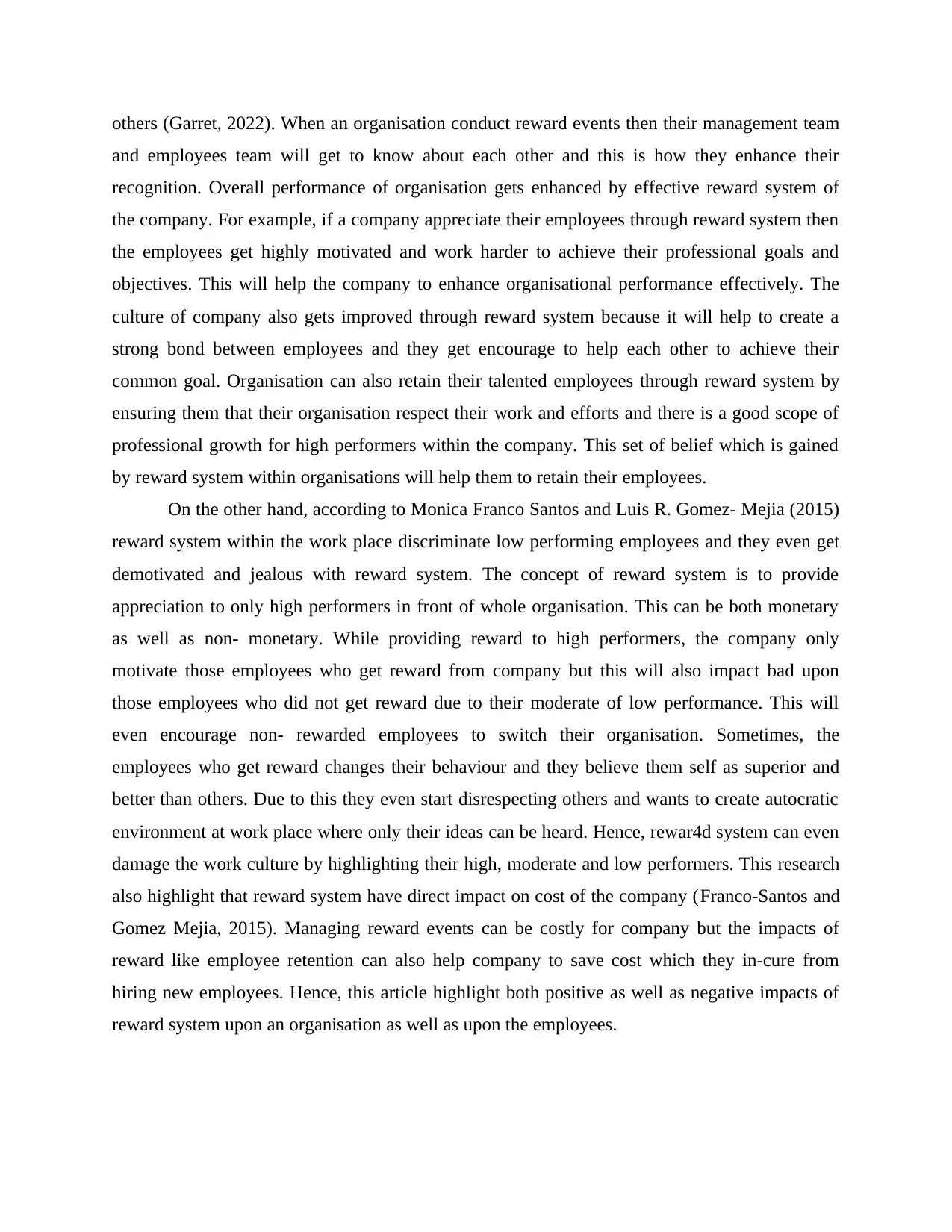
others (Garret, 2022). When an organisation conduct reward events then their management team
and employees team will get to know about each other and this is how they enhance their
recognition. Overall performance of organisation gets enhanced by effective reward system of
the company. For example, if a company appreciate their employees through reward system then
the employees get highly motivated and work harder to achieve their professional goals and
objectives. This will help the company to enhance organisational performance effectively. The
culture of company also gets improved through reward system because it will help to create a
strong bond between employees and they get encourage to help each other to achieve their
common goal. Organisation can also retain their talented employees through reward system by
ensuring them that their organisation respect their work and efforts and there is a good scope of
professional growth for high performers within the company. This set of belief which is gained
by reward system within organisations will help them to retain their employees.
On the other hand, according to Monica Franco Santos and Luis R. Gomez- Mejia (2015)
reward system within the work place discriminate low performing employees and they even get
demotivated and jealous with reward system. The concept of reward system is to provide
appreciation to only high performers in front of whole organisation. This can be both monetary
as well as non- monetary. While providing reward to high performers, the company only
motivate those employees who get reward from company but this will also impact bad upon
those employees who did not get reward due to their moderate of low performance. This will
even encourage non- rewarded employees to switch their organisation. Sometimes, the
employees who get reward changes their behaviour and they believe them self as superior and
better than others. Due to this they even start disrespecting others and wants to create autocratic
environment at work place where only their ideas can be heard. Hence, rewar4d system can even
damage the work culture by highlighting their high, moderate and low performers. This research
also highlight that reward system have direct impact on cost of the company (Franco-Santos and
Gomez Mejia, 2015). Managing reward events can be costly for company but the impacts of
reward like employee retention can also help company to save cost which they in-cure from
hiring new employees. Hence, this article highlight both positive as well as negative impacts of
reward system upon an organisation as well as upon the employees.
and employees team will get to know about each other and this is how they enhance their
recognition. Overall performance of organisation gets enhanced by effective reward system of
the company. For example, if a company appreciate their employees through reward system then
the employees get highly motivated and work harder to achieve their professional goals and
objectives. This will help the company to enhance organisational performance effectively. The
culture of company also gets improved through reward system because it will help to create a
strong bond between employees and they get encourage to help each other to achieve their
common goal. Organisation can also retain their talented employees through reward system by
ensuring them that their organisation respect their work and efforts and there is a good scope of
professional growth for high performers within the company. This set of belief which is gained
by reward system within organisations will help them to retain their employees.
On the other hand, according to Monica Franco Santos and Luis R. Gomez- Mejia (2015)
reward system within the work place discriminate low performing employees and they even get
demotivated and jealous with reward system. The concept of reward system is to provide
appreciation to only high performers in front of whole organisation. This can be both monetary
as well as non- monetary. While providing reward to high performers, the company only
motivate those employees who get reward from company but this will also impact bad upon
those employees who did not get reward due to their moderate of low performance. This will
even encourage non- rewarded employees to switch their organisation. Sometimes, the
employees who get reward changes their behaviour and they believe them self as superior and
better than others. Due to this they even start disrespecting others and wants to create autocratic
environment at work place where only their ideas can be heard. Hence, rewar4d system can even
damage the work culture by highlighting their high, moderate and low performers. This research
also highlight that reward system have direct impact on cost of the company (Franco-Santos and
Gomez Mejia, 2015). Managing reward events can be costly for company but the impacts of
reward like employee retention can also help company to save cost which they in-cure from
hiring new employees. Hence, this article highlight both positive as well as negative impacts of
reward system upon an organisation as well as upon the employees.
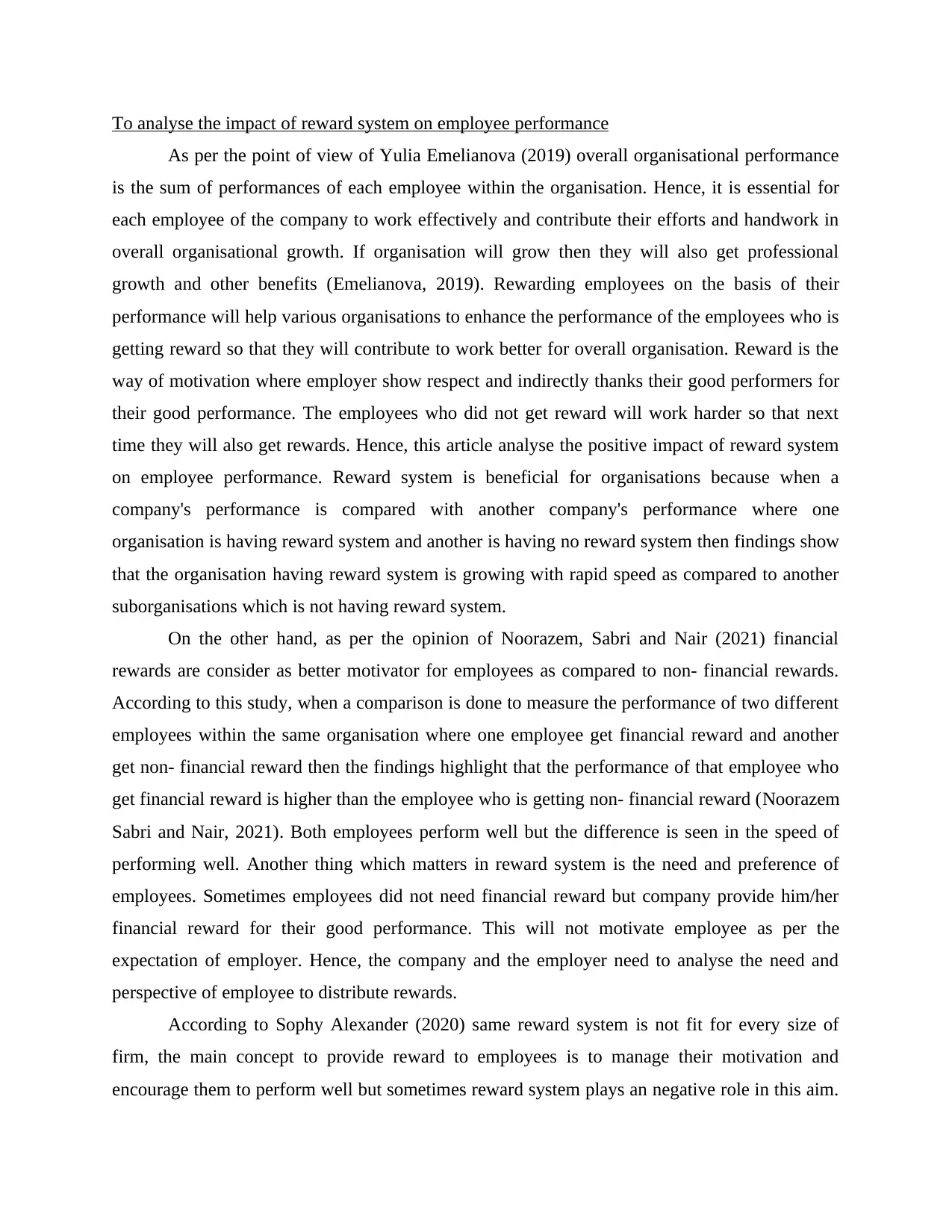
To analyse the impact of reward system on employee performance
As per the point of view of Yulia Emelianova (2019) overall organisational performance
is the sum of performances of each employee within the organisation. Hence, it is essential for
each employee of the company to work effectively and contribute their efforts and handwork in
overall organisational growth. If organisation will grow then they will also get professional
growth and other benefits (Emelianova, 2019). Rewarding employees on the basis of their
performance will help various organisations to enhance the performance of the employees who is
getting reward so that they will contribute to work better for overall organisation. Reward is the
way of motivation where employer show respect and indirectly thanks their good performers for
their good performance. The employees who did not get reward will work harder so that next
time they will also get rewards. Hence, this article analyse the positive impact of reward system
on employee performance. Reward system is beneficial for organisations because when a
company's performance is compared with another company's performance where one
organisation is having reward system and another is having no reward system then findings show
that the organisation having reward system is growing with rapid speed as compared to another
suborganisations which is not having reward system.
On the other hand, as per the opinion of Noorazem, Sabri and Nair (2021) financial
rewards are consider as better motivator for employees as compared to non- financial rewards.
According to this study, when a comparison is done to measure the performance of two different
employees within the same organisation where one employee get financial reward and another
get non- financial reward then the findings highlight that the performance of that employee who
get financial reward is higher than the employee who is getting non- financial reward (Noorazem
Sabri and Nair, 2021). Both employees perform well but the difference is seen in the speed of
performing well. Another thing which matters in reward system is the need and preference of
employees. Sometimes employees did not need financial reward but company provide him/her
financial reward for their good performance. This will not motivate employee as per the
expectation of employer. Hence, the company and the employer need to analyse the need and
perspective of employee to distribute rewards.
According to Sophy Alexander (2020) same reward system is not fit for every size of
firm, the main concept to provide reward to employees is to manage their motivation and
encourage them to perform well but sometimes reward system plays an negative role in this aim.
As per the point of view of Yulia Emelianova (2019) overall organisational performance
is the sum of performances of each employee within the organisation. Hence, it is essential for
each employee of the company to work effectively and contribute their efforts and handwork in
overall organisational growth. If organisation will grow then they will also get professional
growth and other benefits (Emelianova, 2019). Rewarding employees on the basis of their
performance will help various organisations to enhance the performance of the employees who is
getting reward so that they will contribute to work better for overall organisation. Reward is the
way of motivation where employer show respect and indirectly thanks their good performers for
their good performance. The employees who did not get reward will work harder so that next
time they will also get rewards. Hence, this article analyse the positive impact of reward system
on employee performance. Reward system is beneficial for organisations because when a
company's performance is compared with another company's performance where one
organisation is having reward system and another is having no reward system then findings show
that the organisation having reward system is growing with rapid speed as compared to another
suborganisations which is not having reward system.
On the other hand, as per the opinion of Noorazem, Sabri and Nair (2021) financial
rewards are consider as better motivator for employees as compared to non- financial rewards.
According to this study, when a comparison is done to measure the performance of two different
employees within the same organisation where one employee get financial reward and another
get non- financial reward then the findings highlight that the performance of that employee who
get financial reward is higher than the employee who is getting non- financial reward (Noorazem
Sabri and Nair, 2021). Both employees perform well but the difference is seen in the speed of
performing well. Another thing which matters in reward system is the need and preference of
employees. Sometimes employees did not need financial reward but company provide him/her
financial reward for their good performance. This will not motivate employee as per the
expectation of employer. Hence, the company and the employer need to analyse the need and
perspective of employee to distribute rewards.
According to Sophy Alexander (2020) same reward system is not fit for every size of
firm, the main concept to provide reward to employees is to manage their motivation and
encourage them to perform well but sometimes reward system plays an negative role in this aim.
⊘ This is a preview!⊘
Do you want full access?
Subscribe today to unlock all pages.

Trusted by 1+ million students worldwide
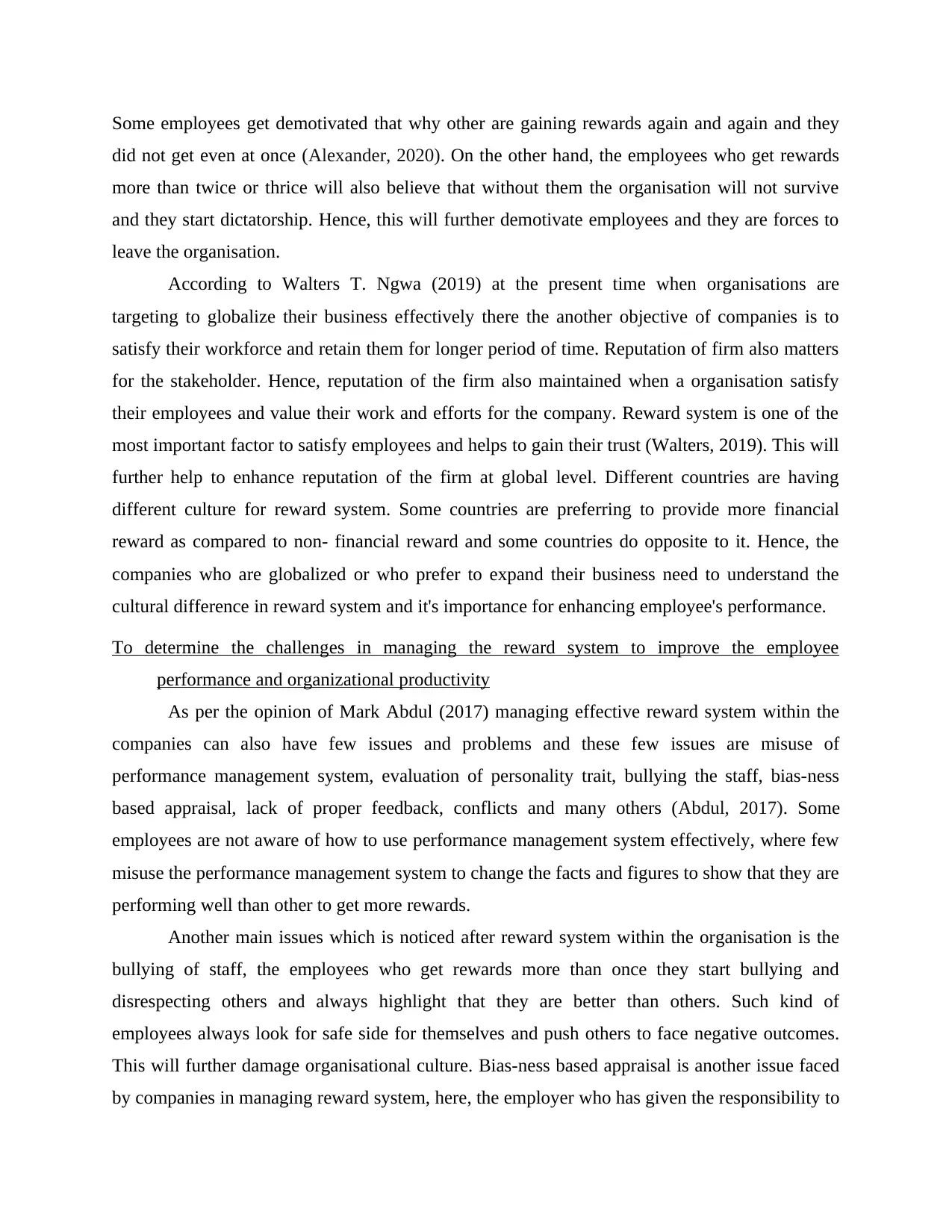
Some employees get demotivated that why other are gaining rewards again and again and they
did not get even at once (Alexander, 2020). On the other hand, the employees who get rewards
more than twice or thrice will also believe that without them the organisation will not survive
and they start dictatorship. Hence, this will further demotivate employees and they are forces to
leave the organisation.
According to Walters T. Ngwa (2019) at the present time when organisations are
targeting to globalize their business effectively there the another objective of companies is to
satisfy their workforce and retain them for longer period of time. Reputation of firm also matters
for the stakeholder. Hence, reputation of the firm also maintained when a organisation satisfy
their employees and value their work and efforts for the company. Reward system is one of the
most important factor to satisfy employees and helps to gain their trust (Walters, 2019). This will
further help to enhance reputation of the firm at global level. Different countries are having
different culture for reward system. Some countries are preferring to provide more financial
reward as compared to non- financial reward and some countries do opposite to it. Hence, the
companies who are globalized or who prefer to expand their business need to understand the
cultural difference in reward system and it's importance for enhancing employee's performance.
To determine the challenges in managing the reward system to improve the employee
performance and organizational productivity
As per the opinion of Mark Abdul (2017) managing effective reward system within the
companies can also have few issues and problems and these few issues are misuse of
performance management system, evaluation of personality trait, bullying the staff, bias-ness
based appraisal, lack of proper feedback, conflicts and many others (Abdul, 2017). Some
employees are not aware of how to use performance management system effectively, where few
misuse the performance management system to change the facts and figures to show that they are
performing well than other to get more rewards.
Another main issues which is noticed after reward system within the organisation is the
bullying of staff, the employees who get rewards more than once they start bullying and
disrespecting others and always highlight that they are better than others. Such kind of
employees always look for safe side for themselves and push others to face negative outcomes.
This will further damage organisational culture. Bias-ness based appraisal is another issue faced
by companies in managing reward system, here, the employer who has given the responsibility to
did not get even at once (Alexander, 2020). On the other hand, the employees who get rewards
more than twice or thrice will also believe that without them the organisation will not survive
and they start dictatorship. Hence, this will further demotivate employees and they are forces to
leave the organisation.
According to Walters T. Ngwa (2019) at the present time when organisations are
targeting to globalize their business effectively there the another objective of companies is to
satisfy their workforce and retain them for longer period of time. Reputation of firm also matters
for the stakeholder. Hence, reputation of the firm also maintained when a organisation satisfy
their employees and value their work and efforts for the company. Reward system is one of the
most important factor to satisfy employees and helps to gain their trust (Walters, 2019). This will
further help to enhance reputation of the firm at global level. Different countries are having
different culture for reward system. Some countries are preferring to provide more financial
reward as compared to non- financial reward and some countries do opposite to it. Hence, the
companies who are globalized or who prefer to expand their business need to understand the
cultural difference in reward system and it's importance for enhancing employee's performance.
To determine the challenges in managing the reward system to improve the employee
performance and organizational productivity
As per the opinion of Mark Abdul (2017) managing effective reward system within the
companies can also have few issues and problems and these few issues are misuse of
performance management system, evaluation of personality trait, bullying the staff, bias-ness
based appraisal, lack of proper feedback, conflicts and many others (Abdul, 2017). Some
employees are not aware of how to use performance management system effectively, where few
misuse the performance management system to change the facts and figures to show that they are
performing well than other to get more rewards.
Another main issues which is noticed after reward system within the organisation is the
bullying of staff, the employees who get rewards more than once they start bullying and
disrespecting others and always highlight that they are better than others. Such kind of
employees always look for safe side for themselves and push others to face negative outcomes.
This will further damage organisational culture. Bias-ness based appraisal is another issue faced
by companies in managing reward system, here, the employer who has given the responsibility to
Paraphrase This Document
Need a fresh take? Get an instant paraphrase of this document with our AI Paraphraser
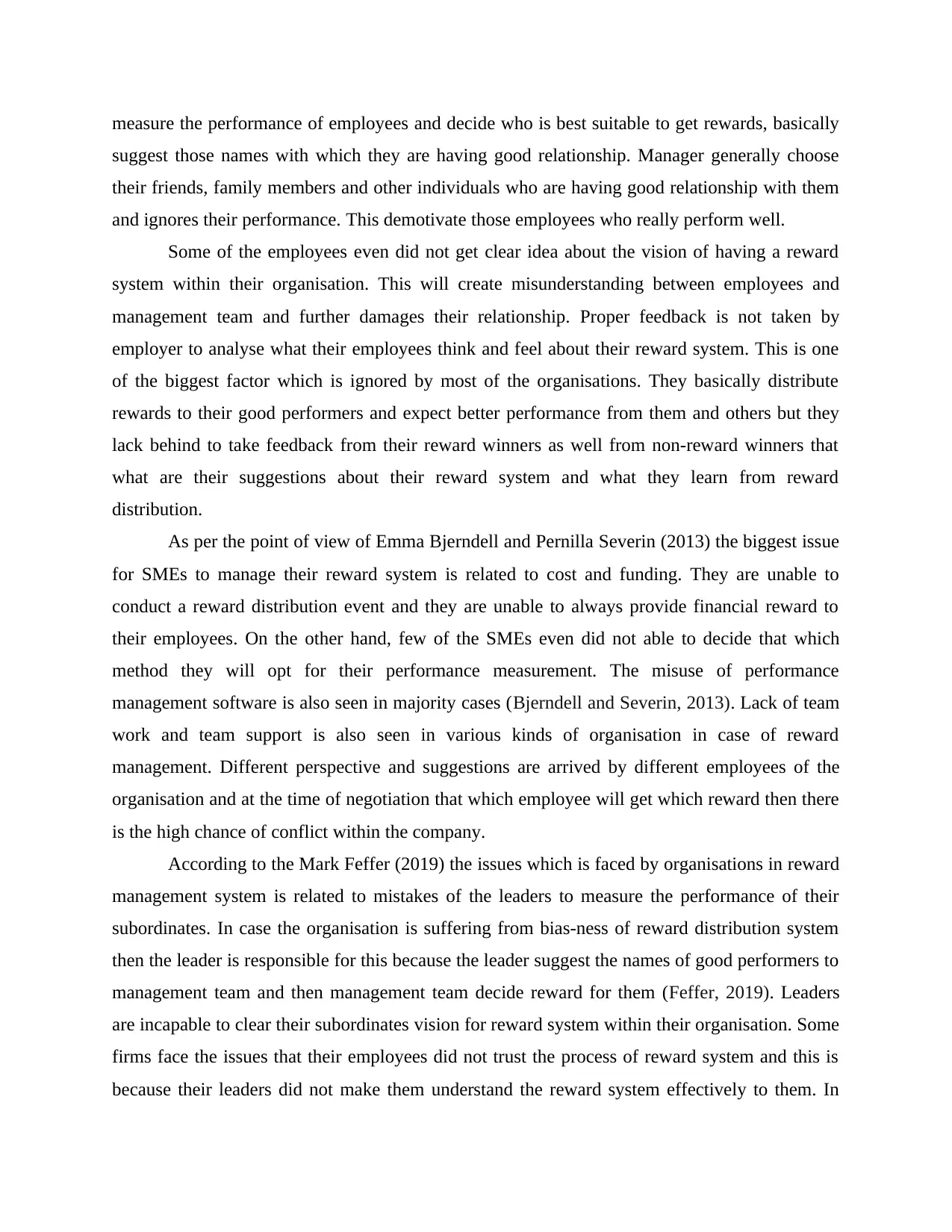
measure the performance of employees and decide who is best suitable to get rewards, basically
suggest those names with which they are having good relationship. Manager generally choose
their friends, family members and other individuals who are having good relationship with them
and ignores their performance. This demotivate those employees who really perform well.
Some of the employees even did not get clear idea about the vision of having a reward
system within their organisation. This will create misunderstanding between employees and
management team and further damages their relationship. Proper feedback is not taken by
employer to analyse what their employees think and feel about their reward system. This is one
of the biggest factor which is ignored by most of the organisations. They basically distribute
rewards to their good performers and expect better performance from them and others but they
lack behind to take feedback from their reward winners as well from non-reward winners that
what are their suggestions about their reward system and what they learn from reward
distribution.
As per the point of view of Emma Bjerndell and Pernilla Severin (2013) the biggest issue
for SMEs to manage their reward system is related to cost and funding. They are unable to
conduct a reward distribution event and they are unable to always provide financial reward to
their employees. On the other hand, few of the SMEs even did not able to decide that which
method they will opt for their performance measurement. The misuse of performance
management software is also seen in majority cases (Bjerndell and Severin, 2013). Lack of team
work and team support is also seen in various kinds of organisation in case of reward
management. Different perspective and suggestions are arrived by different employees of the
organisation and at the time of negotiation that which employee will get which reward then there
is the high chance of conflict within the company.
According to the Mark Feffer (2019) the issues which is faced by organisations in reward
management system is related to mistakes of the leaders to measure the performance of their
subordinates. In case the organisation is suffering from bias-ness of reward distribution system
then the leader is responsible for this because the leader suggest the names of good performers to
management team and then management team decide reward for them (Feffer, 2019). Leaders
are incapable to clear their subordinates vision for reward system within their organisation. Some
firms face the issues that their employees did not trust the process of reward system and this is
because their leaders did not make them understand the reward system effectively to them. In
suggest those names with which they are having good relationship. Manager generally choose
their friends, family members and other individuals who are having good relationship with them
and ignores their performance. This demotivate those employees who really perform well.
Some of the employees even did not get clear idea about the vision of having a reward
system within their organisation. This will create misunderstanding between employees and
management team and further damages their relationship. Proper feedback is not taken by
employer to analyse what their employees think and feel about their reward system. This is one
of the biggest factor which is ignored by most of the organisations. They basically distribute
rewards to their good performers and expect better performance from them and others but they
lack behind to take feedback from their reward winners as well from non-reward winners that
what are their suggestions about their reward system and what they learn from reward
distribution.
As per the point of view of Emma Bjerndell and Pernilla Severin (2013) the biggest issue
for SMEs to manage their reward system is related to cost and funding. They are unable to
conduct a reward distribution event and they are unable to always provide financial reward to
their employees. On the other hand, few of the SMEs even did not able to decide that which
method they will opt for their performance measurement. The misuse of performance
management software is also seen in majority cases (Bjerndell and Severin, 2013). Lack of team
work and team support is also seen in various kinds of organisation in case of reward
management. Different perspective and suggestions are arrived by different employees of the
organisation and at the time of negotiation that which employee will get which reward then there
is the high chance of conflict within the company.
According to the Mark Feffer (2019) the issues which is faced by organisations in reward
management system is related to mistakes of the leaders to measure the performance of their
subordinates. In case the organisation is suffering from bias-ness of reward distribution system
then the leader is responsible for this because the leader suggest the names of good performers to
management team and then management team decide reward for them (Feffer, 2019). Leaders
are incapable to clear their subordinates vision for reward system within their organisation. Some
firms face the issues that their employees did not trust the process of reward system and this is
because their leaders did not make them understand the reward system effectively to them. In
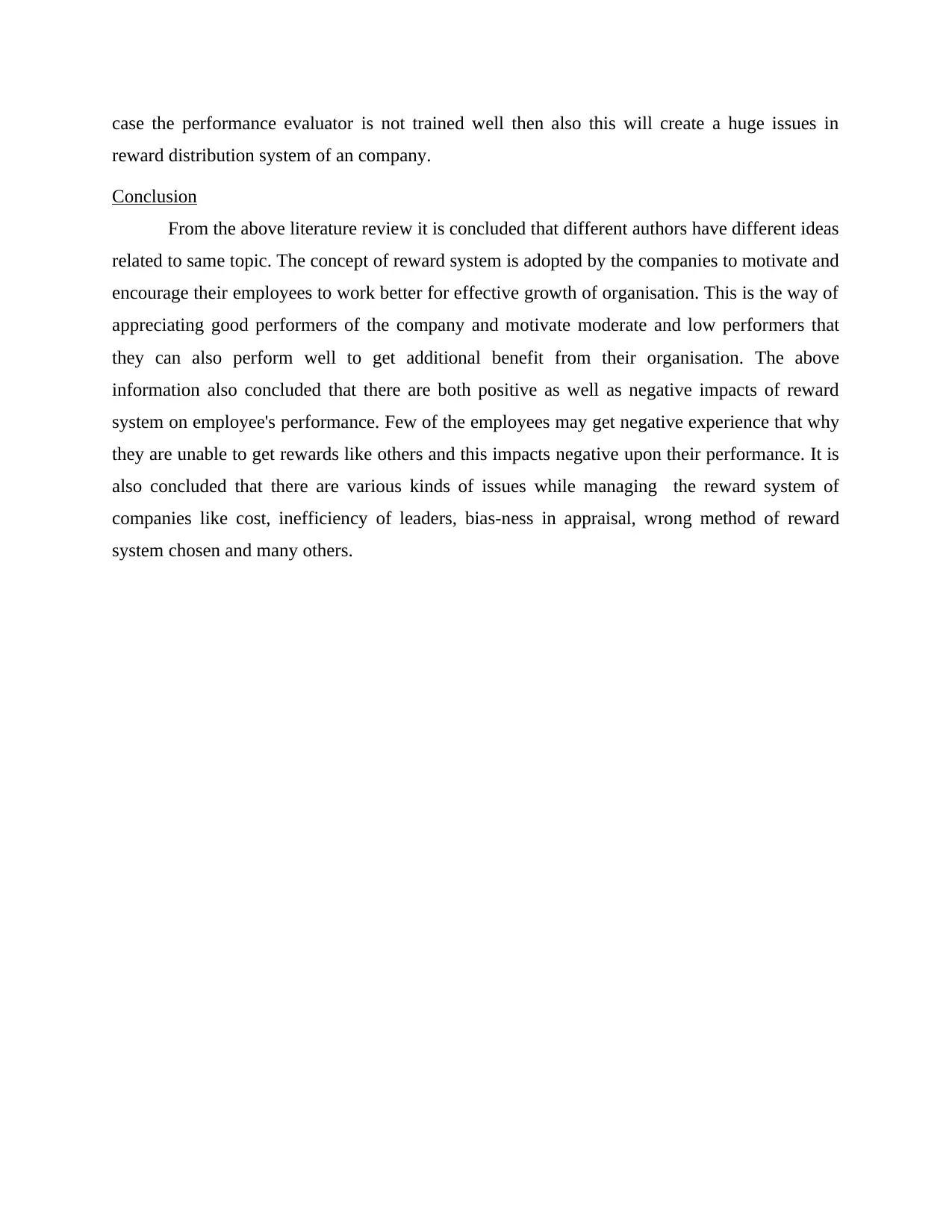
case the performance evaluator is not trained well then also this will create a huge issues in
reward distribution system of an company.
Conclusion
From the above literature review it is concluded that different authors have different ideas
related to same topic. The concept of reward system is adopted by the companies to motivate and
encourage their employees to work better for effective growth of organisation. This is the way of
appreciating good performers of the company and motivate moderate and low performers that
they can also perform well to get additional benefit from their organisation. The above
information also concluded that there are both positive as well as negative impacts of reward
system on employee's performance. Few of the employees may get negative experience that why
they are unable to get rewards like others and this impacts negative upon their performance. It is
also concluded that there are various kinds of issues while managing the reward system of
companies like cost, inefficiency of leaders, bias-ness in appraisal, wrong method of reward
system chosen and many others.
reward distribution system of an company.
Conclusion
From the above literature review it is concluded that different authors have different ideas
related to same topic. The concept of reward system is adopted by the companies to motivate and
encourage their employees to work better for effective growth of organisation. This is the way of
appreciating good performers of the company and motivate moderate and low performers that
they can also perform well to get additional benefit from their organisation. The above
information also concluded that there are both positive as well as negative impacts of reward
system on employee's performance. Few of the employees may get negative experience that why
they are unable to get rewards like others and this impacts negative upon their performance. It is
also concluded that there are various kinds of issues while managing the reward system of
companies like cost, inefficiency of leaders, bias-ness in appraisal, wrong method of reward
system chosen and many others.
⊘ This is a preview!⊘
Do you want full access?
Subscribe today to unlock all pages.

Trusted by 1+ million students worldwide
1 out of 27
Related Documents
Your All-in-One AI-Powered Toolkit for Academic Success.
+13062052269
info@desklib.com
Available 24*7 on WhatsApp / Email
![[object Object]](/_next/static/media/star-bottom.7253800d.svg)
Unlock your academic potential
Copyright © 2020–2026 A2Z Services. All Rights Reserved. Developed and managed by ZUCOL.





